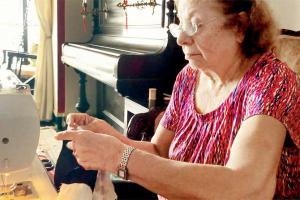It's what she does every Sunday, right after church. And each one will save an infant's life in some distant village

Every Sunday, Zelma Lazarus makes eight patchwork baby blankets
 There's an old lady in Bandra at whose house I'm welcome whenever I happen to be passing through Mumbai. It's on the 12th floor of a sturdy old high-rise on Carter Road, with a sweeping view of the Arabian Sea obstructed only by an inebriate seaward-leaning coconut palm and a Christmas tree that Zelma Lazarus herself planted decades ago, which now stands ten storeys high. Definitely the tallest Christmas tree I've ever seen.
There's an old lady in Bandra at whose house I'm welcome whenever I happen to be passing through Mumbai. It's on the 12th floor of a sturdy old high-rise on Carter Road, with a sweeping view of the Arabian Sea obstructed only by an inebriate seaward-leaning coconut palm and a Christmas tree that Zelma Lazarus herself planted decades ago, which now stands ten storeys high. Definitely the tallest Christmas tree I've ever seen.
ADVERTISEMENT
Zelma has lived in this sunswept, windblown house for as long as I've known her, which would be almost 40 years, right from when she was around 40 herself. She turned 81 eight days ago, but still lives independently, goes to work every morning, church every Sunday, and for a stroll along the sea every evening. She enjoys crossword puzzles and sentimental rhyming poetry, writes everything down so that nothing is forgotten, loves a rich breakfast with cheeses, cold cuts, eggs and home-made butter, and never misses the 9 o'clock news.
And every Sunday, she makes eight patchwork baby blankets. This might be a good moment to reveal that as long as I've known her, Zelma has been a wilful, strong-headed woman. When she wants something, she goes after it and always gets it. She will use charm, smiles, nudges and cream cakes, or just park herself at your door till you say yes to whatever she wants.
Back around 1983, when she worked in Voltas, what she wanted was three empty railway coaches. She thought it would be cool to rebuild them as a travelling hospital with separate coaches for diagnosis, surgery and outpatients. In her fantasy, these converted coaches could be shunted with existing trains to remote areas where they could be sidelined. For a couple of weeks, Zelma thought, the coaches could dispense surgical and health services to thousands of poor people from miles around.
The trains, Zelma was sure, would be provided free by the Railway Ministry, the doctors would give their services for free and various corporations would pay for everything else. It was a simple plan. She walked into the office of the Railways Minister, one George Fernandes, and politely made her outrageous request. The minister, probably overwhelmed by her audacity, meekly agreed. As did everyone else that came after. The Lifeline Express made its maiden expedition in 1991.
As of June this year, Zelma's train, now with seven coaches, has brought new life to over a million disabled people in 192 rural Indian locations, conducting 1,37,000 surgeries in 130 districts across 20 states, with skills donated by over 2,00,000 surgeons. Their medical services have covered impaired vision and hearing, orthopaedic problems, cleft palates, dental problems, epilepsy, cancer of the mouth, breast and cervix, family planning and stroke prevention. The hospital-on-tracks has spawned similar initiatives in China, South Africa, Bangladesh and Cambodia. In India, it has now expanded to include the Community Health Initiative in Maharashtra's Thane district.
And, the tireless woman behind all this for some reason stitches eight baby blankets every Sunday. Her maid cuts squares out of cloth donated by other residents and Zelma pedals away at her ancient Singer machine. It's the kind of thing you can easily miss, an old lady at a sewing machine. After all, it's what old ladies do, so your brain filters it out as unremarkable. This was why it was only after several months of Mumbai visits that I thought of asking her, "Zelma, why on earth do you make so many baby blankets?"
And that's how I learned about placentas, hypothermia and why 26 in 1,000 babies die during childbirth in Thane district, Maharashtra. You probably didn't know that almost one-third of a newborn's blood is still inside the placenta, an organ attached to the womb that carries nutrition and oxygen from the mother's body to the baby through the umbilical cord. I certainly did not know that. Cutting the cord too soon, before this blood has moved back into the infant's body, could produce underweight babies at risk for anaemia.
Zelma noticed midwives in Palghar waiting patiently for the placenta to emerge before cutting the cord so that the baby's blood is fully restored to it, a process that can last between 10 minutes and an hour. During this time, the infant is placed on the hut's cold floor. The stark difference between the womb's warmth and the cold floor rapidly lowers the newborn's body temperature, leading to death from hypothermia.
"You mean they wouldn't die if they were somehow kept warm until the placenta was out?" she asked incredulously. Zelma has stitched close to 3,000 baby blankets, eight every Sunday. And yes, you can help save a few babies yourself, by reaching out to info@impactindia.org. Just do it.
Here, viewed from there. C Y Gopinath, in Bangkok, throws unique light and shadows on Mumbai, the city that raised him. You can reach him at cygopi@gmail.com Send your feedback to mailbag@mid-day.com
 Subscribe today by clicking the link and stay updated with the latest news!" Click here!
Subscribe today by clicking the link and stay updated with the latest news!" Click here!






